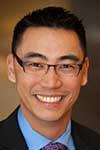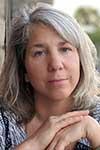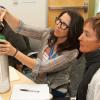
The UCSF School of Nursing is continuing its rich history of preparing the next generation of nurse leaders to meet growing health care demands through its academic degree programs.
Building Nursing Leaders From the Ground Up
Bold leadership is needed to solve health care’s complex issues.
The UCSF School of Nursing is stepping up efforts to meet that need with a new, innovative initiative that will equip nurses with the skills to lead within their organizations. In addition, the School is continuing its rich history of preparing the next generation of nurse leaders to meet growing health care demands through its academic degree programs.
Providing Leadership Development for Nurses
Nurses comprise the world’s largest health care workforce, yet leadership development for this population has lagged significantly. The School of Nursing, in collaboration with UCSF Health, are working to change that with the launch of the UCSF Leadership Institute for Nursing, scheduled for early 2021.
 Gina Intinarelli, Justin Pohl “Health care education has mostly focused on disease pathways and patient care delivery,” said Gina Intinarelli, (MS ‘05, PhD ‘13) the School’s associate dean of clinical affairs and UCSF Health’s associate chief nursing officer for nursing excellence. “And it isn’t just in nursing. Overall, clinicians aren’t trained in leadership and management skills. The vision for the new institute is to offer programming through modern educational techniques that has a national and international reach. We want it to become a global center of excellence.”
Gina Intinarelli, Justin Pohl “Health care education has mostly focused on disease pathways and patient care delivery,” said Gina Intinarelli, (MS ‘05, PhD ‘13) the School’s associate dean of clinical affairs and UCSF Health’s associate chief nursing officer for nursing excellence. “And it isn’t just in nursing. Overall, clinicians aren’t trained in leadership and management skills. The vision for the new institute is to offer programming through modern educational techniques that has a national and international reach. We want it to become a global center of excellence.”
The institute, supported by private gifts and contracts, will offer tailored programs based on a nurse’s experience and career trajectory. Director Justin Pohl has identified four groups of clinicians to serve: Those excelling in patient care and show leadership promise, beginning managers with less than one year of experience, those with five to 10 years of managerial experience and executives. Some concepts, like personnel management, will be taught across all four programs while others — like financial management — will be tailored to specific tracks.
Advancing leadership development for nursing has been a career commitment for Catherine Gilliss, dean of the School of Nursing, who is writing a book on the subject with four nurse colleagues. In discussions with administrators at UCSF Health and other health systems, she found opportunities for leadership development — outside of formal education — were not keeping up with demand, prompting the School of Nursing and UCSF Health to partner on the new initiative.
The majority of the institute’s programming will be delivered virtually, providing a global reach. Program instruction will be a collaboration among the School’s faculty and executive health care professionals.
“By 2024, we expect to be a nationally recognized provider of leadership preparation for nurses,” Pohl said.
Advocating for California Nurses
While the new UCSF institute will provide leadership development, the School’s academic degree programs are continuing to prepare nursing students to lead in advanced health care delivery and in the development of transformative health care solutions.
UCSF nursing alumni have held leadership positions in health care organizations, conducted innovative research, and shaped health policy at the state and national levels.
Garrett Chan (MS ’00, PhD ’05) is especially adept in that role as president and chief executive officer of HealthImpact, a nationally recognized nursing workforce center that works with academic institutions, government, health care providers, foundations and other organizations to advance solutions that positively impact California nurses and patients.
Chan’s leadership abilities are tested daily collaborating with these diverse stakeholders.
“You have to make space for multiple perspectives to be brought forward,” Chan said. “That’s where negotiation skills and diplomacy come in. In statewide or national leadership Garrett Chan roles, it is essential to lead by influence because there isn’t direct authority.”
Garrett Chan roles, it is essential to lead by influence because there isn’t direct authority.”
Chan’s influence is most evident in the recent passage of AB 890, legislation that expands the scope of practice for nurse practitioners (NPs) in California. Chan and School of Nursing professor Joanne Spetz served as subject matter experts to the bill’s sponsor, California State Assembly Member Jim Wood (D-Santa Rosa) and his staff.
“Improving access to safe patient care has always been the focus, and NPs are the workforce that makes that happen,” he said.
Chan relies on the School’s experts to collaborate on policy advocacy, as well as improve access to and streamline educational programs. Chan’s work focuses on strengthing the pipeline into nursing, supporting health and well-being of the workforce and creating opportunities for career mobility. One project he leads is expanding access to specialty education to help fill job vacancies — mostly in critical need areas. For example, HealthImpact, working with the Hospital Association of Southern California, created an academic partnership for perioperative education with Azusa Pacific University and Mount Saint Mary’s University to help fill vacant perioperative nursing positions in Southern California.
“UCSF has a great community of experts in a wide array of specialty areas,” said Chan, who is also an adjunct associate professor at the School. “Working with colleagues who can offer different strategies for policies, and students who bring fresh ideas to our initiatives strengthens that work and amplifies its impact.”
Putting Patients First
Graduates from the School’s academic programs, like Kim Hildebrand Cardoso (MS ’98), have also found creative ways to improve health care for underserved populations. The leadership skills Cardoso developed at the School of Nursing inspired more than 20 years of inventive problem solving that has enhanced care for women and families.
Cardoso points to leadership skills she learned in the School’s Master’s Entry Program in Nursing (MEPN) that prepared her to think critically and initiate change when she saw problems that needed to be addressed.
 Kim Cardoso “I had to take a leadership class as part of the MEPN program and I thought, ‘Why? I just want to deliver babies,’ ” Cardoso said. “But it opened my eyes to all the ways nurses and midwives can be leaders. I wasn’t a leader before. It was only after I went to UCSF that I recognized the importance of leadership.”
Kim Cardoso “I had to take a leadership class as part of the MEPN program and I thought, ‘Why? I just want to deliver babies,’ ” Cardoso said. “But it opened my eyes to all the ways nurses and midwives can be leaders. I wasn’t a leader before. It was only after I went to UCSF that I recognized the importance of leadership.”
In addition to co-founding the Women’s Community Clinic shortly after graduating from the School, Cardoso developed partnerships to strengthen the continuity of care for pregnant women.
Cardoso found that expectant mothers in the San Francisco Bay Area’s East Bay were visiting multiple clinics, but those clinics didn’t adequately share patient histories and related information with each other. As a result, patients were forced to retell medical histories and sometimes received differing, fragmented guidance from clinicians.
Her solution: unite the clinics through the Perinatal Safety Net Partnership, a professional support group for medical providers and support staff to share best practices. The partnership has enhanced efficiency for clinicians and patients, resulting in more integrated care.
“All we want to do is to take care of our patients,” said Cardoso, associate medical director, women’s health at LifeLong Medical Care. “This partnership shows how an entire region can take care of these patients collectively.”
Cardoso’s ability to find creative solutions to problems has had a lasting impact across LifeLong Medical Care. When an interim director position at LifeLong’s Ashby Health Center became available — a position that had never been occupied by an advanced practice nurse — Cardoso and a clinic psychiatrist shared the position. The interprofessional collaboration succeeded, and the duo was permanently installed in that position a year later. Since then, four nurse practitioners have moved into medical director roles at LifeLong.
That success encouraged Cardoso to propose the creation of a women’s health leadership role to improve perinatal and sexual health care, a position she has held for the past five years.
“I kept seeing the problems and the solutions, but you need to have agency to make positive change to make the organization more efficient,” Cardoso said. “That’s what this role does, and it enables us to provide better care to patients.”



